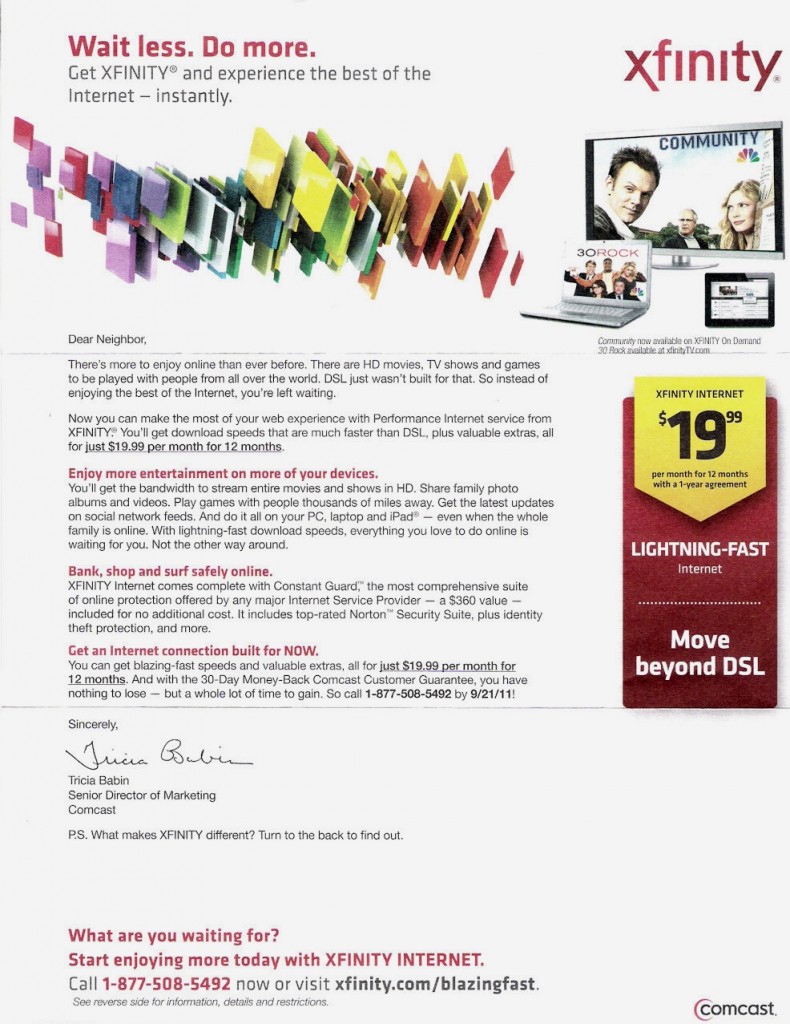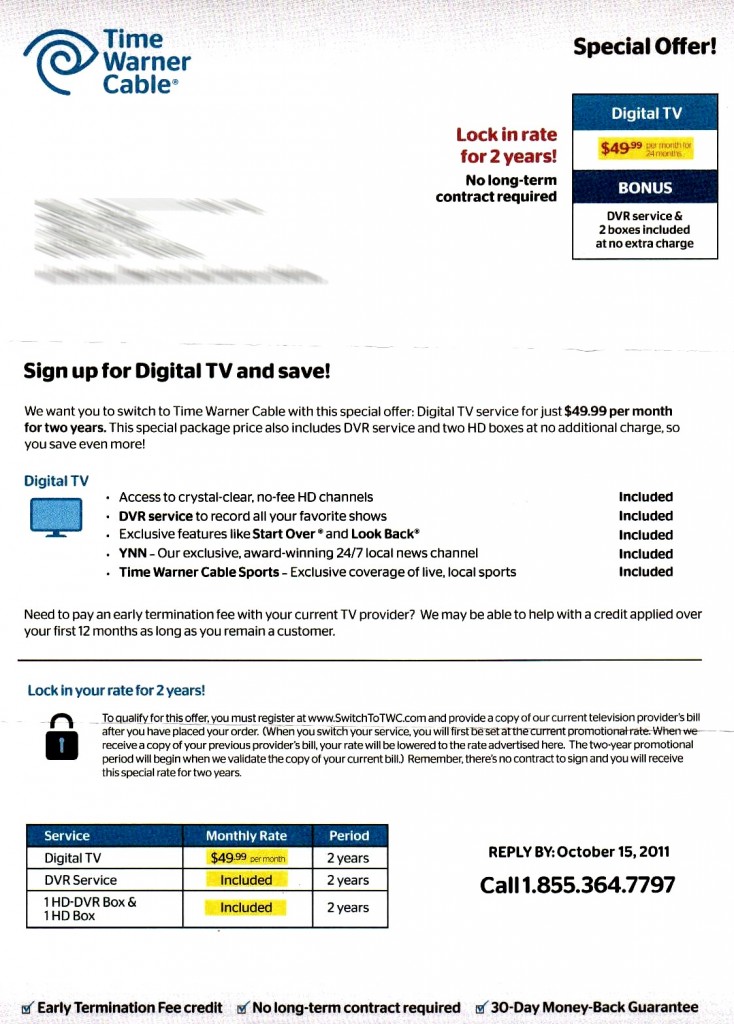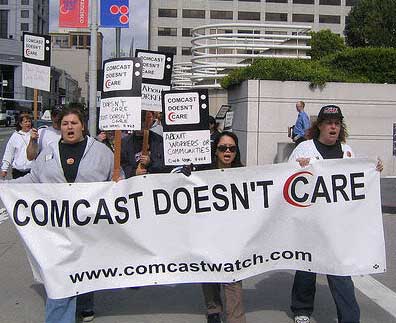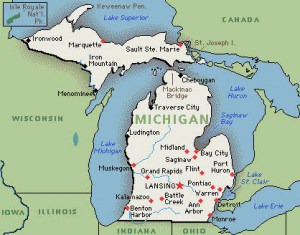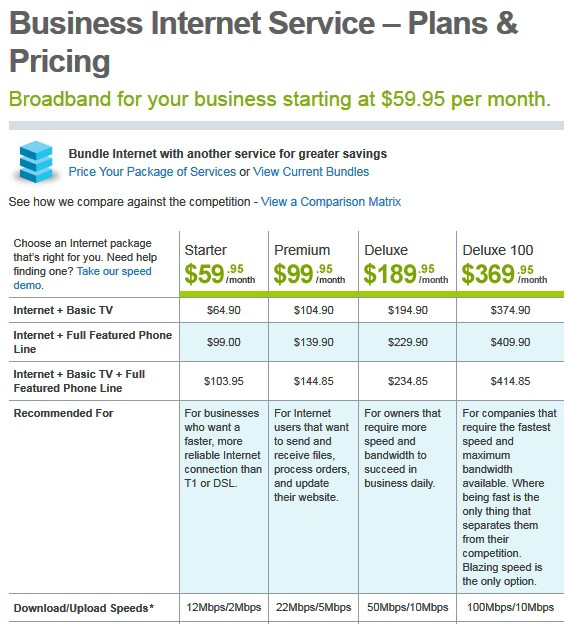Big cable companies are targeting their non-customers, and those current customers who refuse to sign up for triple-play bundles, with some of the most aggressively-priced promotions in years. The two largest, Comcast/Xfinity and Time Warner Cable, have been sending out letters offering dirt cheap $20 Internet service or cable television packages that include DVR service, a second set top box, and hundreds of digital cable channels for $49.99 a month for two years.
Comcast
Comcast promotions vary in different markets, depending on who their competitors are. The best pricing goes to new customers, as a recent promotion sent to suspected DSL customers in their service areas illustrates.
The cable company is pitching 12 months of Xfinity Performance (typically around 12Mbps) for $19.99 a month for the first year for new customers only. Some customers report they can cancel penalty-free at the end of the first year, while others are told Comcast is actually pitching a two-year contract where the price of the service increases to $34.99 a month during the second year (a early cancellation fee pro-rated to less than $50 applies in some areas if you cancel early). This pricing applies to standalone service, which makes it aggressively priced. Most cable providers charge a higher price for Internet-only service. Some customers also report a $25 or more installation fee applies (and in some areas an in-person install is required for new customers). We’ve heard from some readers that successfully qualified for the promotion under the name of a spouse if they have had Comcast service previously. Otherwise, Comcast usually requires customers to be without service for 90 days before they are considered “new customers.”
Customers can try calling 1-877-508-5492 to request this offer: $19.99/Month for 1 year with no additional service required (Code at bottom of letter: LTP79376-0014).
If that number does not work from your calling area, other numbers to try include: 1-877-298-0903 (CA, TX), 1-877-508-5492 (CA, WV), 1-877-494-9166 in NJ (currently pitching 6-month version of this promotion without contract.)
If 12Mbps is not fast enough, ask the representative what promotional pricing exists for faster speeds. Some customers scored 35Mbps service for $10 more per month.
A separate ongoing promotion from Comcast offers Blast Internet service at 25Mbps+ on similar terms. But pricing varies wildly in different markets. Customers in California were able to purchase this promotion for as little as $19.99 a month with a year-long contract, while customers in Chicago were asked to pay $39 for essentially the same service.
Comcast’s promotions list runs several pages, so if you are shot down asking for these promotions, ask about other current offers or hang up and try calling again and asking to speak with someone else. Your results may vary depending on the representative you speak with. Remember Comcast’s 250GB usage cap applies to all residential service plans.
Time Warner Cable
In addition to regular Road Runner standalone Internet service promotions that deliver Standard Service speeds for $29-35 a month for a year, Time Warner has been getting very aggressive trying to win back cord-cutters and those who have left for a competing pay television provider. The cable company has mailed letters to non-cable TV customers in the northeast pitching substantial discounts on cable TV service price-locked (but no commitment term for you) for two years and includes free DVR equipment, DVR service, and a second set top box with digital cable TV for $49.99 a month. They’ll even credit back the cost of any early termination fees charged by another provider over the course of the first year of service.
The promotion is intended primarily for customers who already receive service from another provider, but new customers can call 1-855-364-7797 and ask for the offer without the competing provider early termination fee rebate. If you do receive service from another provider, there are various requirements and steps to follow to qualify for up to $200 in termination fee credits. Visit SwitchtoTWC or call them to learn the details.
Neither of these promotions work for existing Time Warner Cable customers. If you already subscribe, discounts will be offered when you threaten to cancel service. Retention deals from Time Warner Cable can be as aggressively priced as new customer promotions. We have found retention offers made during the initial call to request a service disconnection are often not very aggressive. Most representatives try and pare back your package before starting to offer retention pricing (which gradually gets better the more times you reply, “is that the best you can offer?”)
Our best recommendation is to call and request to cancel service 2-3 weeks from today and wait for a Time Warner Cable retention specialist to call you (answer those mystery caller ID calls — it could be Time Warner). The reps that call you directly often deliver the most aggressive retention deals. If nobody does reach out to you, call Time Warner yourself a few days before the disconnect is scheduled and ask them to make you an offer to rescind your disconnect request. You may find some serious savings taking this approach. If not, you still have time to rescind your disconnect request on your own before the plug gets pulled.


 Subscribe
Subscribe